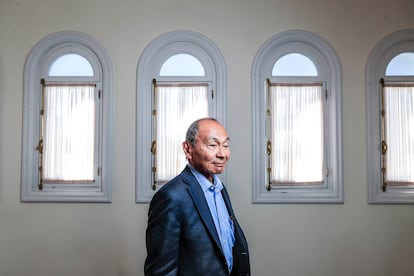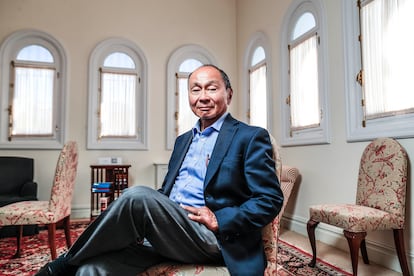Francis Fukuyama: ‘The neoliberals went too far. Now, we need more social democratic policies’
The political scientist, who at the beginning of the 1990s declared ‘the end of history,’ returns with a new book where he identifies the threats to classical liberalism: runaway capitalism and too much identity politics


Francis Fukuyama answers questions quickly and accurately, with surgical precision: it is clear that he has given a lot of thought to what he says.
In the early 1990s, he gained worldwide fame for declaring “the end of history” after the fall of the Soviet Union and the end of the Cold War. Liberal democracy had triumphed, he said.
However, in his new book, Liberalism and Its Discontents, he detects new threats to the classical liberal model that he defends. On the one hand, misguided neoliberalism – which demonized the state – put an end to solidarity, generating unsustainable inequality. On the other, runaway identity currents – be it the conspiratorial nationalist right or a left that is too focused on minorities – have created new societal ruptures.
The 69-year-old Chicago-born political scientist received EL PAÍS at the Rafael del Pino Foundation in Madrid.
Question. When we talk about liberalism, we associate it with the center-right, although if we think back to the French Revolution, it was more associated with the left.
Answer. I have a very broad definition of liberalism… in Europe, you’re right, it’s associated with the center-right. In the United States, it’s associated with the left. I say that liberalism is a doctrine that protects individual rights and limits the power of the state. And it can be either left or right in economic terms. But what’s important is the rule of law as a foundation for a society.
Q. How did liberalism lead to the neoliberalism that you criticize?
A. I think that there was excess state regulation and state interference in economies that had developed by the 1970s. And so, you had politicians like Ronald Reagan and Margaret Thatcher that tried to roll back some of that regulation. They were supported in this by very prominent economists, like Milton Friedman. The problem was that [they] went too far and attempted to undermine all forms of state activity, even necessary ones, for example, of regulating the financial system. And as a result, we ended up with a globalization that increased inequality and led to substantial instability in the global financial system. And this, of course, provoked a populist backlash that you see both on the left and the right, which partially explains why we are where we are today.
Q. Sometimes you hear justifications for economic inequality. To what extent is inequality justified?
A. I think that there always has to be some balance between the need for economic growth and the need for a society that protects people from at least the worst aspects of a market economy.
Q. But right now inequality is starting to be problematic.
A. Well, I don’t think that you can generalize. In Latin America, you have a continent that has experienced a great degree of inequality. A lot of the populist politics that you see in places like Argentina or Venezuela are the result of this kind of inequality, which leads to both very bad economic outcomes, but also very bad politics, because we have this polarization between a populist left and ultra-conservative right. In other parts of the world, it’s not [the case]. In Germany, the Netherlands, Scandinavia, you’ve had social democratic parties in power for a long time. [They’ve] done a lot of redistribution – you don’t get this kind of polarized politics and you have an alteration between the center-left and center-right, which I think is much healthier.
Q. I have the impression, from reading your book, that you’ve taken a turn towards a more social democratic vision.
A. Well, I was never opposed to social democracy. I think that it really depends on the historical period and the degree of state intervention. By the 1960s, many social democratic societies had become mired in low growth [and] high inflation. At that point, I think it was important to roll some of that back. That is, in fact, what happened in Scandinavia. Most of those countries reduced tax rates, reduced levels of regulation and therefore became more productive. But I think that in the current period, we need more social democracy, especially in the United States. We still don’t have universal health care, which I think is ridiculous for a rich country, a rich democratic country. My attitude towards social democracy really depends on what period you’re talking about and what country you’re talking about.
I was never opposed to social democracy
Q. In Spain, when people talk about identity politics, such as feminism or the LGTBQ+ movement, they are sometimes criticized as collectivist. In your book, they seem to have their roots in classical liberalism, in the affirmation of individual rights.
A. Identity politics arise because certain groups are discriminated against or marginalized. And it’s perfectly legitimate to use identity as a means of social mobilization to push back against marginalization. I think that identity politics becomes problematic in a liberal society when one’s fixed identity becomes the most essential thing that one knows about somebody, when you’re making judgments about people simply on the basis of their membership in a group and not what they’ve accomplished as individuals. There’s an acceptable liberal version of identity politics, but I think it can be very problematic.
Q. These groups are sometimes accused of fostering a “cancel culture.” Does such a culture exist?
A. In certain parts of the United States and other countries you have a very intolerant form of progressive politics that really does not want alternative views to be expressed. And so, yes, people are cancelled and fired from [their] jobs or shouted down. And that’s particularly problematic when it happens in universities, because universities are dedicated to free expression and the free exploration of ideas. [This is] a dangerous trend that’s been promoted by a certain version of identity politics.
Q. There are cases of this phenomenon in Spain, but it’s not clear if they should be labelled as part of a “culture.”
A. Well, it’s not a general culture. I think that in the United States, it’s probably more extreme than in Spain or many European countries. Partly it has to do with our racial history, because racial inequality was the first and most basic civil rights issue. It was a very big problem in the United States and it became a pattern for other groups: for women, for gays and lesbians and transgender people to assert their rights. So I think it’s an issue of particular sensitivity. But I agree with you. It’s not clear that it’s a general culture because it’s something that is particularly prominent in more elite institutions like universities or Hollywood or the traditional media. But it’s not, generally speaking, in the society as a whole.

Q. How has the internet affected the way we talk about politics?
A. The internet has made possible the amplification of certain voices on a scale that is unprecedented… but it has also been able to silence certain voices, because social media is the primary means by which we communicate politically these days. And I think both of [these factors] are problematic in terms of freedom of speech.
Social media is the primary means by which we communicate politically these days
Q. Are we living through a crisis of trust that has been caused by social media?
A. Trust in institutions has been declining for 50 years. [This] decline has accelerated because there are anti-democratic forces that actively want to undermine trust. For example, what the Russians have done in social media is not to promulgate their point of view – it’s really to undermine the trust that people have in democratic societies, in their institutions.
Q. Liberalism defends the autonomy of the individual. To what extent should societies be individualistic?
A. Societies need to have common social values. You can’t communicate if you don’t have a common language and a common set of cultural reference points by which you can interact with other people. When individualism gets to the point where people are actually making up their own values systems or living in close cultural communities where they can’t communicate or interact, I think that’s an excessive degree of individualism.
Q. How do we find a balance?
A. I think that you have to rely on the fact that human beings are social creatures that have powerful social instincts. We have to balance between excessive individualism, but also an excessive degree of social conformity.
Q. To what extent can individual freedom – something so sacred to liberals – be limited?
A. All liberal societies have to [be able to] preserve their own institutions. When you get a political party, for example, that is anti-democratic or anti-liberal, that, if it gains power, it’s going to shut down freedom of expression, not going to permit future democratic elections and so forth, a liberal society has the right to defend itself.
During the Cold War, you had a number of communist parties in France, Italy and Spain that were anti-liberal… there was a lot of resistance to them being permitted to freely participate in the system because there was a fear that, if they came to power, they would never leave power. I think there was a similar suspicion of a lot of Islamist parties. That was one of the reasons for the reaction against the Muslim Brotherhood in Egypt. A liberal society must [have the ability] to protect itself from illiberal forces.
Q. Is there a risk of moving towards an illiberal world?
A. There are two separate threats right now. The most severe one is from a resurgent populist nationalism that’s represented by Orbán in Hungary, by Erdoğan in Turkey, by Modi in India, by Donald Trump in the United States. All of these people were legitimately elected… but they use their legitimacy to threaten illiberal institutions. They want to eliminate the independent court system, they want to shut down opposition media, they [weaponize] the justice system to go after their political opponents. Then, there’s a separate threat coming from the left, which mostly applies in cultural settings, because you don’t have a left that’s come to power in quite the same way, at least in Europe and in North America. In Latin America, it’s different, because you do have a populist left that has behaved in a very similar authoritarian way in Venezuela and Nicaragua.
Q. Are liberalism and democracy always fellow travellers?
A. They are allies and they support each other, but they don’t necessarily have to exist at the same time. Orbán wants an illiberal democracy, with elections, but without freedom of the press or belief or free opposition. There are also liberal societies without democracy, like Singapore: there is individual freedom, but there are no elections.
Q. What do you think of the recently deceased Mikhail Gorbachev?
A. Well, he [leaves behind] a very mixed legacy. I think he remained a communist to the end. He didn’t want the Soviet Union to fall apart in the way that it did. But among communists, he had some very liberal tendencies. Glasnost was basically an appeal for greater freedom of expression… and that actually ended up undermining the former Soviet Union, because when people were allowed to speak freely, it turned out that, in many of the republics of the Soviet Union, what they said was: “I want my country to be separate from the Soviet Union.” It happened in the Baltics and in Ukraine and in many other places. Gorbachev did not intend for that to happen and he was very upset that it did. But I think, honestly, we have to admit that, without Gorbachev, all those countries would still be trapped in a Soviet dictatorship.
Q. In the 1990s, you spoke of “the end of history.” Now we talk more about the end of the world!
A. I never said that liberal democracy would triumph everywhere, or that it would be the system that would end all our problems. If you take something like climate change – especially generated by economic growth – I don’t think that liberal democracy is worse at managing it than authoritarian governments, as is sometimes thought. Democracies have been more efficient in reducing emissions. The Chinese economy, for example, is based on fossil fuels.
Q. How do you see the future of civilization?
A. I’m optimistic in the sense that I believe that there’s been a lot of progress. Historically, if we take a very long view of history, humans have been remarkably able to adapt and shape their world.
Tu suscripción se está usando en otro dispositivo
¿Quieres añadir otro usuario a tu suscripción?
Si continúas leyendo en este dispositivo, no se podrá leer en el otro.
FlechaTu suscripción se está usando en otro dispositivo y solo puedes acceder a EL PAÍS desde un dispositivo a la vez.
Si quieres compartir tu cuenta, cambia tu suscripción a la modalidad Premium, así podrás añadir otro usuario. Cada uno accederá con su propia cuenta de email, lo que os permitirá personalizar vuestra experiencia en EL PAÍS.
¿Tienes una suscripción de empresa? Accede aquí para contratar más cuentas.
En el caso de no saber quién está usando tu cuenta, te recomendamos cambiar tu contraseña aquí.
Si decides continuar compartiendo tu cuenta, este mensaje se mostrará en tu dispositivo y en el de la otra persona que está usando tu cuenta de forma indefinida, afectando a tu experiencia de lectura. Puedes consultar aquí los términos y condiciones de la suscripción digital.








































